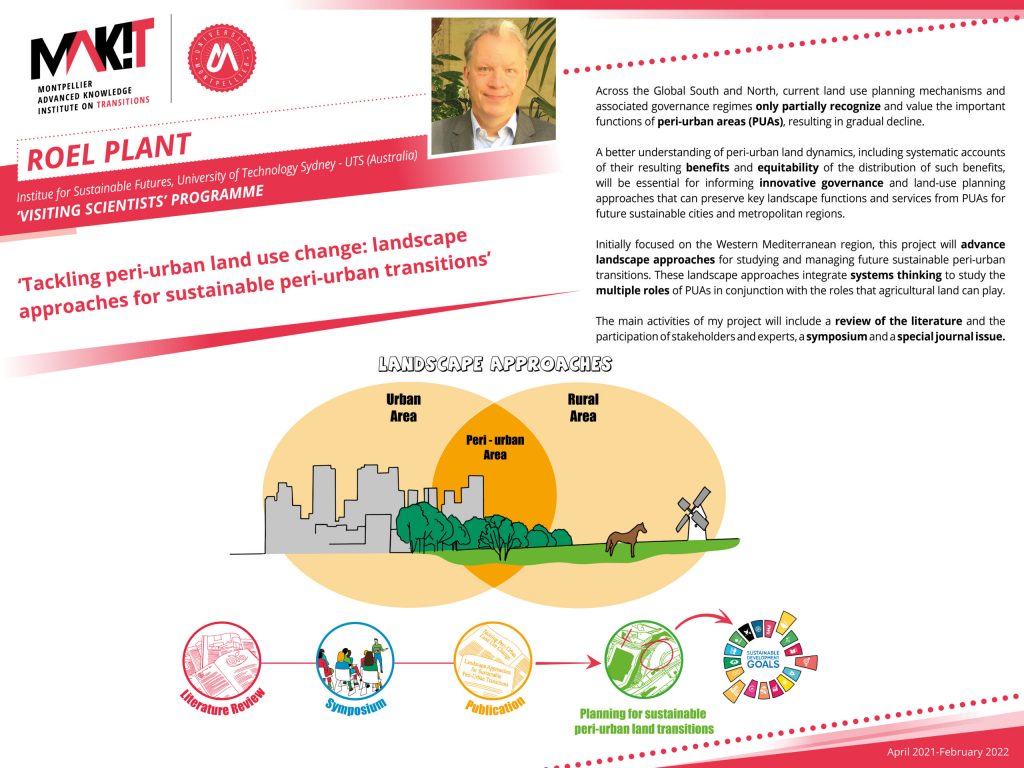Roel Plant
Roel Plant’s field of enquiry is the interactions between people, landscapes and ecosystems. His specific interest is in how values, meanings and scales emerge and play out in spatio-environmental decision-making processes and other (economic) institutions for the governance of ‘nature’ and the ‘environment’ in our times of modernity – the Anthropocene. Applications and thematic foci include biodiversity conservation, landscape and territorial planning and governance, urban sprawl and peri-urban transitions.
Dr. Plant originally trained as a Physical Geographer in the Netherlands (Utrecht University. MSc 1993) and obtained his PhD in Agricultural and Environmental sciences, focused on land-based greenhouse gas emissions, from Wageningen University in 1999. For the past five years, Roel served as Team Leader and Research Director, Landscapes & Ecosystems, Climate Adaptation & Food Systems (LECAFS) at the Institute for Sustainable Futures, University of Technology Sydney (Australia).
For the past 15 years, his projects have all revolve around economic, social and philosophical notions of value in environmental decision-making, with application to land and water management, landscape, biodiversity conservation and infrastructure development. Two of Dr. Plant’s signature projects include the development of an Australian framework for evaluating broader benefits from aquatic systems (funded by the Australian Government National Water Commission), and a two-year collaborative project focused on terrestrial and aquatic ecosystem values in Thau Lagoon and Costières de Nîmes, Southern France (funded by Cemagref/Irstea).
Dr. Plant has worked in a variety of research environments in the Netherlands, the USA, Costa Rica, Australia and France, covering not-for profit research and consulting, applied scientific and industry research as well as university-based academic research. He has over 75 publications in a variety of outlets and formats, including ranked academic journals, technical reports, guidance materials and toolboxes.
Across the Global North and South, current land use planning mechanisms and associated governance regimes only partially recognise and value the important functions of peri-urban areas (PUAs). This results in the gradual decline of the important roles, services and functions that PUAs perform and provide.
In an urbanising and warming world, PUAs are becoming important assets for both metropolitan and rural areas, contributing to, for example, food provision, environmental quality and human health. At the same time, ‘land-hungry’ processes, such as urbanisation, the industrialisation of agriculture and the transition to renewable forms of energy, place increasing demands on PUAs.
A better understanding of peri-urban land dynamics, including robust, shared accounts of their resulting benefits and equitability of the distribution of such benefits, will be essential for informing innovative landscape planning and management that can preserve and prepare landscapes for the future.
The project’s key premise is that the landscape scale can bring novel perspectives, insights and value propositions that can help planners, managers and researchers to approach PUAs as important social-ecological systems rather than as mere ‘suburbs in waiting’ and thereby make progress towards at least three of the 17 UN Sustainable Development Goals (SDGs): Sustainable Cities and Communities (SDG 11); Zero Hunger (SDG 2); and Life on Land (SDG 15).
This project will focus on landscape approaches for the analysis, management and governance of peri-urban land in the Global South and North. The premise of landscape approaches is that they can offer a coherent framework for analysing these changes across domains of knowledge, and across siloed domains of environmental management and governance.
The project’s scientific aim is to synthesise innovative methodological approaches for addressing key peri-urban land challenges across four thematic/disciplinary landscape dimensions: ecological; economic and developmental; socio-cultural; and political. The research will draw from extensive literature review and expert experiences with landscape approaches in Western Mediterranean peri-urban contexts.
